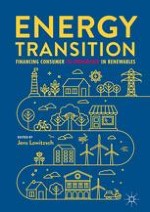2019 | OriginalPaper | Buchkapitel
5. Consumer (Co-)Ownership and Behaviour: Economic Experiments as a Tool for Analysis
verfasst von : Özgür Yildiz, Julian Sagebiel
Erschienen in: Energy Transition
Verlag: Springer International Publishing
Aktivieren Sie unsere intelligente Suche, um passende Fachinhalte oder Patente zu finden.
Wählen Sie Textabschnitte aus um mit Künstlicher Intelligenz passenden Patente zu finden. powered by
Markieren Sie Textabschnitte, um KI-gestützt weitere passende Inhalte zu finden. powered by
Abstract
Across Europe and worldwide, the sustainable transition of energy systems from fossil fuels towards renewables and higher energy efficiency led to the emergence of business models involving citizens. This involvement included participation in renewable energy project planning and financing with self-consumption having either a subordinate or no importance at all as well as business models that explicitly foster consumer (co-)ownership that confers ownership rights in renewable projects to prosumers in a local or regional area. Proponents of these business models have identified positive aspects such as changes in individual consumption behaviour towards improved energy efficiency through the assistance and advice on the adoption of environmental friendly technologies and energy efficiency measures. However, methodological concerns on these results remain as a clear examination of the causal effects of belonging to consumer (co-)owned energy initiative on energy use requires collecting experimental or quasi-experimental data which has not been done so far. The aim of this chapter therefore is twofold: First, we provide an overview on existing studies related to the behaviour of members of consumer (co-)owned models (CCOM). Second, starting from this short review, we will assess the potential contribution of experimental methods for the analysis of the behaviour of CCOM members and give recommendations for further experimental research.
